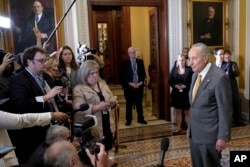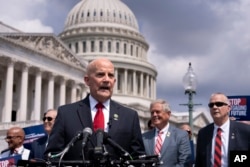U.S. House Speaker Kevin McCarthy's attempt to restart his stalled spending agenda failed on Thursday when Republicans for a third time blocked a procedural vote on defense spending, raising the risk of a government shutdown in just 10 days.
The House of Representatives voted 216-212 against beginning debate on an $886 billion defense appropriations bill amid opposition from a small group of hardline conservative Republicans.
It represented a setback for McCarthy the morning after his fractious 221-212 majority met for 2-1/2 hours seeking common ground on legislation to avert the fourth government shutdown in a decade beginning October 1.
As the vote failed, McCarthy told reporters that he will pursue the "same strategy I had from January: just keep working; never give up."
Federal agencies will begin to shut down on October 1 unless Congress passes either a short-term continuing resolution, known as a CR, or a full-year funding bill. So far House Republicans have failed to unify around either possibility, and the ideas they have considered have only Republican support, making them unlikely to win support in the Democratic-majority Senate or be signed into law by President Joe Biden.
"Instead of decreasing the chance of a shutdown, Speaker McCarthy is actually increasing it by wasting time on extremist proposals that cannot become law in the Senate," top Senate Democrat Chuck Schumer said.
The bill had been scheduled for a five-minute vote that Republicans kept open for over a half hour in a vain hope of winning additional votes.
Republican Representative Keith Self, who had voted to advance the bill, said the motion's failure showed a lack of trust in McCarthy's leadership.
"It's a matter of trust," Self told reporters while declining to elaborate. Asked about the mood in the chamber, Self said: "There were emotions running high."
Donald Trump, the front-runner for the 2024 Republican presidential nomination, added to McCarthy's distractions with a call to shut the government, as occurred three times during his four years in the White House.
"Republicans in Congress can and must defund all aspects of Crooked Joe Biden’s weaponized Government that refuses to close the Border, and treats half the Country as Enemies of the State," the former president said on his Truth Social platform.
Trump is awaiting four criminal trials, including two brought by federal prosecutors, over charges including his attempts to overturn his 2020 election defeat. He has claimed without evidence that all four prosecutions are politically motivated.
Political brinkmanship has begun to attract the attention of Wall Street, with rating agency Fitch citing repeated down-to-the-wire negotiations that threaten the government's ability to pay its bills when it downgraded U.S. debt rating to AA+ from its top-notch AAA designation earlier this year.
"The unpredictability is sad for the country," said Representative Rosa DeLauro, top Democrat on the House appropriations panel. "They have stopped our ability to respond to the needs of the American people."
The Republican spending agenda has run afoul of a small group of Republican hardline conservatives, who want assurances that fiscal 2024 appropriations will not exceed a 2022 top line of $1.47 trillion, $120 billion less than McCarthy and Biden agreed to in May.
A bipartisan group of 64 lawmakers known as the "Problem Solvers Caucus" proposed a measure that would fund the government through January 11, though without McCarthy's support it is unclear how the measure would advance.
McCarthy on Tuesday had to pull a procedural vote on a proposed 30-day CR. Then a vote to open floor debate on the defense appropriations bill failed. The defense bill had already been delayed earlier in the month.
McCarthy has proposed a 30-day CR that would cut spending to the 2022 level, according to two sources familiar with the discussion. The CR would include a commission to tackle the federal debt and conservative restrictions on immigration and the border.
McCarthy's proposal would also set a top line for full-year fiscal 2024 spending at just under $1.53 trillion, the sources said. That is still $60 billion less than he agreed to with Biden in May.
It was not clear how much support the CR or the 2024 top line would draw from House Republicans.








